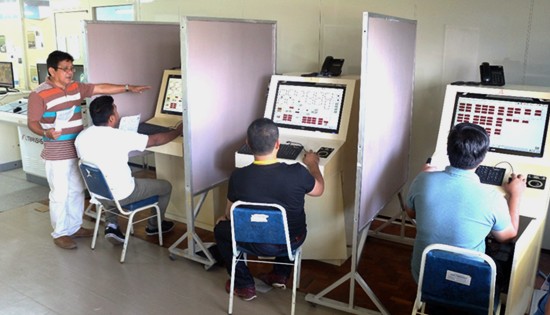|

NMP’s
1st Batch of Updating Training for Officers In Charge of an
Engineering Watch with their instructor CE Salvador C. Esquibel, Jr. (left). |
NMP offers
updating training for officers in charge of an engineering watch
By
National Maritime
Polytechnic
September 1, 2018
TACLOBAN CITY – The
National Maritime Polytechnic (NMP), serving within its mandate on
upgrading the skills and competencies of the country’s seafarers
continues to pursue priority thrusts on training quality, access and
relevance and responsive maritime researches.
With its intention of
addressing the shortage of Filipino merchant marine officers, the
Agency intensified its activities on the development of new training
courses which include among others the Updating Training for
Officers In Charge of an Engineering Watch (UTOICEW) - Functions 1,
2, and 4 (Parts A and B).
It can be recalled that
the NMP submitted its application for accreditation for the said
course in CY 2016. MARINA conducted its initial inspection last
12-15 December 2016 and issued a corresponding Notice of
Deficiencies on 22 February 2017.
NMP submitted its
compliance to the deficiencies noted by MARINA on 24 March 2017. In
order to validate if indeed the deficiencies noted were duly
rectified, MARINA conducted a re-inspection on 23-24 January 2018.
As per formal letter
received from MARINA dated 14 August 2018, NMP was granted full
course approval valid for a period of three (3) years along with the
accreditation of instructors, assessors and supervisors who will be
handling the said course.
During the said period,
announced and unannounced visits will be made by MARINA STCW Office
or its duly authorized representatives to ascertain NMP’s compliance
with MARINA’s rules and regulations.
NMP is required to submit
the records of review and validation of the aforementioned course
within six (6) months from the date of its conduct. Moreover, the
records of implementation of corrective actions for audit results
both internal and external, records of review and validation of the
courses including the assessment and statistical record of trainees
enrolled / certificated must be made available during the conduct of
monitoring.
NMP’s first batch of
classes for UTOICEW Function 1 – Part A opened on 27 August 2018 and
will end on 04 September 2018 with five (5) participants. Same
enrollees will take the Function 2 – Part A (05-07 September 2018)
and Function 3 – Part A (10-13 September 2018).
UTOICEW is a 39-day course
divided into three (3) Functions. Function 1 (Marine Engineering at
the Operational Level) has five (5) modules; Function 2 (Electrical,
Electronic and Control Engineering at the Operational Level) with
two (2) modules; and Function 4 (Controlling the Operation of the
Ship and Care for Persons on Board at the Operational Level) with
four (4) modules.
Engine officers who have
taken up the course are expected to have acquired competence to be
able to: maintain a safe engineering watch; operate main and
auxiliary machinery and associated control systems; manage the
operation of propulsion plant machinery; plan and schedule
operations; operate surveillance, performance assessment and
maintain safety of propulsion plant and auxiliary machinery; operate
electrical, electronic and control systems; manage operation of
electrical and electronic control equipment; ensure compliance with
pollution prevention requirements; apply leadership and team working
skills; control trim, stability and stress; and monitor and control
compliance with legislative requirements and measures to ensure
safety of life at sea, security and the protection of the marine
environment.
Meanwhile, NMP continues
to upgrade its facilities and provide maritime trainings required
pursuant to the STCW Convention as amended in 2010 including
value-adding courses towards improving the qualifications of
Filipino seafarers for their employment acceptability and enhanced
competitiveness. It also regularly conducts maritime studies to come
up with policies for the improvement of the manpower sector of the
industry.